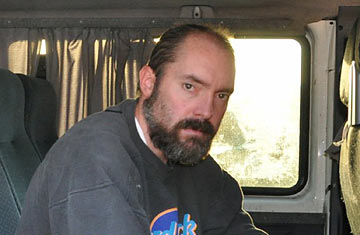
Jack Teitel sits in an Israeli police vehicle after being arrested in the West Bank settlement of Shvut Rachel
"Jewish terrorist" is a term that sends shudders through Israeli society, which tends to associate terrorism only with Palestinians. Yet every few years Israel is forced to deal with the reality that a handful of its citizens are capable of wanton murder driven by hate. The charges filed by Israeli police on Nov. 1 against Jack Teitel, a 37-year-old Florida-born West Bank settler, include the murders of two Palestinians and attacks wounding three other people over the past 12 years. But according to the charges — which are based, according to the police, on Teitel's confession — his hatred was not confined to Palestinians, but also targeted Israeli leftists, Messianic Jews and gays.
The first attack of which Teitel is accused was the murder of Samir Billbisi, a Palestinian taxi driver who was found shot dead in his cab in East Jerusalem in June 1997. Two months later, allege the police, Teitel shot dead Isaa Mousa'af Mahamada, 57, a Bedouin shepherd near the Carmel settlement in the south Hebron hills. The police claim that during his interrogation, Teitel explained that the shootings were acts of vengeance following a series of Palestinian suicide-bomb attacks against Israeli civilians the year before.
Jerusalem Police Chief Aharon Franko said Teitel, who holds dual U.S.-Israel citizenship, confessed to a spate of attacks and re-enacted them for investigators. The objects of his hatred ranged from Palestinians to gays, Messianic Jews (who share the Christian belief that Jesus was the Jewish Messiah) and the police. His most recent alleged attack was the Sept. 25, 2008, bombing at the home of Professor Zev Sternhell of the Hebrew University of Jerusalem. The well-known left-wing Israeli scholar was lightly wounded; police say Teitel had targeted Sternhell because he believed the professor had called for the killing of Israeli settlers in the West Bank.
What marks Teitel's case as unique is the cautious manner in which he is alleged to have operated over a protracted period. Police say Teitel worked alone, way below the radar of the Shin Bet security service, which monitors extremist activity among Israeli settlers in the West Bank. Teitel is said to have stayed away from open political activity and is not known to have been a member of any extreme, right-wing organization. In his interrogation, police say, Teitel said he smuggled a gun into Israel via a British Airlines flight (at the time he was an Israeli tourist and would not have been easily able to procure a weapon in Israel) and used it to murder two Palestinians in the summer of 1997. Teitel, they say, also told his interrogators that he used the Internet to teach himself how to make deadly bombs.
"Teitel is what we call an autodidact," says a senior Israeli security official, speaking on condition of anonymity. "He bought the materials for these homemade bombs by himself and added pretty sophisticated devices to activate it." In 2000, police say, Teitel smuggled 10 weapons into Israel from the U.S. in a container and concealed them in several places around his home. In another sign of his caution, on the night of his arrest on Oct. 7 in Jerusalem, police say he was posting leaflets while wearing gloves and a balaclava (to prevent identification) and carried a loaded gun in his pocket. By this time, security sources say, he had been under the surveillance of the Shin Bet, following a two-year investigation of an attempted bombing that slowly accumulated clues pointing to him as a suspect.
The leaflets Teitel was posting on the night of his arrest reveal what police say was another of his deadly obsessions: They celebrated the unnamed perpetrator of an August terror attack on a Tel Aviv gay and lesbian youth club in which two young men were killed and five were wounded. Police say Teitel claimed to have carried out the Tel Aviv attack himself, but unlike the other incidents to which he is said to have confessed, the Shin Bet can't find evidence to back this claim. Teitel is said to have told police that his hatred of gays goes back to 1997, when he a stabbed a young Palestinian man in Jerusalem who he believed was was making sexual advances on him.
In 1997, when Teitel is alleged to have murdered the two Palestinians, he was still a U.S. citizen visiting in Israel. Three years later, he returned to live here, moving to the settlement of Shvut Rachel 30 miles north of Jerusalem, where he got married and had four children. He was not involved in the community life of the settlement, and his neighbors described him as quiet and helpful.
If the allegations against him prove true, Teitel will join the list of lone-wolf Jewish terrorists that goes back to Barouch Goldstein, the U.S.-born Jewish settler who in 1994 massacred 29 Palestinians in Hebron's cave of the Patriarchs. "The working assumption of the Shin Bet must be that there are more murderers, lone wolves, operating violently out there against Palestinians," says the organization's former chief, Ami Ayalon. Six cases involving shooting attacks on Palestinians remain unsolved.
Despite the fertile ground of extremist ideas among the Jewish settlers on the West Bank, Shin Bet believes that Teitel worked alone and that even his wife was unaware of his activities. "We were looking for a new Jewish underground operating behind these terrorist attacks, and we couldn't find even one sign supporting it," says a senior Israeli security source. "Teitel was another lone wolf. This kind of terrorist is our nightmare [because] the ability to spot him in advance is so low."
